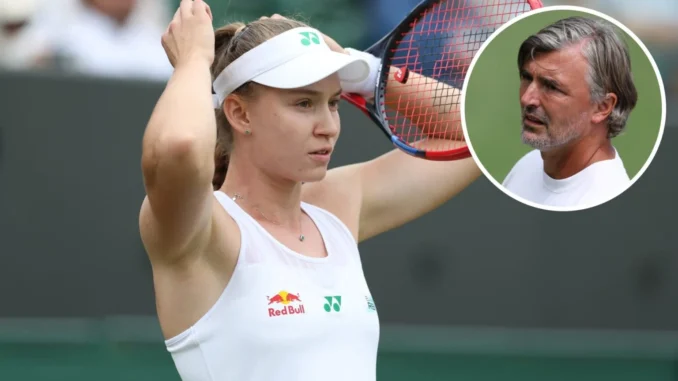
Elena Rybakina, the 2022 Wimbledon champion, has long been heralded as one of the WTA’s brightest talents, and her brief collaboration with coaching legend Goran Ivanisevic only amplified those expectations. The Croatian, a 2001 Wimbledon champion himself, joined Rybakina’s team in late 2024 with high hopes, declaring her the “best tennis player in the world” for her effortless, powerful style. In a candid interview, Ivanisevic revealed his belief that Rybakina, with her towering serve and aggressive game, could win multiple Grand Slams, including additional Wimbledon titles, if she harnessed her full potential. “I think she can win more Slams, that’s for sure,” he said, emphasizing her ability to dominate with simplicity and elegance. Though their partnership ended abruptly after the 2025 Australian Open, Ivanisevic’s lofty expectations have ignited discussions about Rybakina’s trajectory as she navigates a pivotal moment in her career.
Rybakina’s game, built on a blistering serve—often exceeding 120 mph—and flat, penetrating groundstrokes, has drawn comparisons to the sport’s greats. Her 2022 Wimbledon triumph, where she defeated Ons Jabeur 3-6, 6-2, 6-2, showcased her ability to overpower opponents on grass, a surface that rewards her aggressive style. Ivanisevic, who guided Novak Djokovic to nine of his 24 Grand Slam titles and Marin Čilić to the 2014 US Open, saw parallels between his own serve-and-volley prowess and Rybakina’s natural gifts. “Game-wise, she has got a big serve, tall, strong hitter who plays aggressively, she won Wimbledon just like me,” he noted in November 2024, before their partnership began. His confidence in her potential was palpable: “She plays the most beautifully, she plays the simplest, and I really enjoyed it.” Ivanisevic believed that with refined tactics and mental fortitude, Rybakina could add “at least” two or three more majors to her resume, with Wimbledon as her prime hunting ground.
The 2025 season, however, has been a turbulent one for the 26-year-old Kazakhstani star. After a stellar start to 2024, with titles in Brisbane, Abu Dhabi, and Stuttgart, injuries derailed her momentum. A back injury forced her withdrawal from the US Open after one match, and bronchitis sidelined her from the Paris Olympics. Despite reaching the Wimbledon semifinals in 2024, where she fell to Barbora Krejčíková in three sets, Rybakina’s season was marred by inconsistency. Her decision to part ways with longtime coach Stefano Vukov before the US Open, followed by the short-lived stint with Ivanisevic, added to the upheaval. Ivanisevic joined her team in December 2024, with their collaboration kicking off in Dubai’s preseason. “Great first two weeks of preseason in Dubai. Let’s keep it up,” he posted on Instagram, alongside a smiling selfie with Rybakina and her support staff. Yet, their partnership unraveled after Rybakina’s fourth-round loss to Madison Keys at the 2025 Australian Open, 6-3, 1-6, 6-3, amid the controversial return of Vukov, who faced a WTA suspension for alleged misconduct.
Ivanisevic’s departure was marked by a sense of regret. “It was a bit strange,” he told a Croatian broadcaster, describing the split as “a sad and strange story.” He cited off-court issues, particularly Vukov’s influence, as a barrier he couldn’t overcome. “I didn’t want to be part of that,” he said, choosing to step away rather than navigate the complex dynamics. Despite the brevity of their time together—spanning just three official WTA matches at the United Cup and the Australian Open—Ivanisevic’s belief in Rybakina’s potential remained unshaken. “I already considered her the best tennis player in the world before joining her team,” he said, praising her effortless court presence. His vision of multiple Grand Slam titles hinged on her ability to stay healthy and find stability, areas where her 2024 season faltered, with only 39 matches played due to injuries.
Rybakina’s 2025 Cincinnati Open campaign, where she reached the third round before losing to Leylah Fernandez, highlighted both her brilliance and her challenges. Her second-round win over Elise Mertens, 6-4, 6-7(5), 6-3, was marred by an unprecedented 10 double faults in the first set, a struggle she admitted was a career first. “I think I never did so many double faults,” she said, reflecting on the match. Yet, her ability to rally and win in the grueling Cincinnati heat showed the resilience Ivanisevic admired. As she prepares for the US Open, Rybakina’s game—boasting a 71% hard-court win rate in 2025 and 192 aces in 2020—positions her as a contender, but her coaching situation remains fluid. Vukov’s return, despite his ongoing WTA ban, has raised concerns among fans, with some on social media lamenting the lost potential of her partnership with Ivanisevic.
Ivanisevic’s bold prediction underscores Rybakina’s untapped potential. At 26, with a career-high ranking of No. 3 and eight WTA titles, including two WTA 1000 crowns, she has the tools to dominate. Wimbledon, where her serve and flat groundstrokes shine, remains her best chance for additional majors. “I’m really looking forward to this partnership,” Rybakina said when announcing Ivanisevic’s hiring, hopeful for growth after years with Vukov. While their collaboration ended prematurely, Ivanisevic’s endorsement—calling her a player who could “win more Slams”—serves as a rallying cry. As Rybakina navigates health challenges and coaching transitions, her quest for additional Wimbledon titles will test her ability to fulfill the grand vision Ivanisevic saw in her game.
Leave a Reply